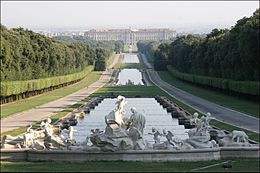
dal 1996 in continua innovazione tecnologica!
Sfrutta tecnologie avanzate per avere un sito web ottimizzato al 100%

18th-Century Royal Palace at Caserta with the Park, the Aqueduct of Vanvitelli, and the San Leucio Complex
The monumental complex at Caserta, created by the Bourbon king Charles III in the mid-18th century to rival Versailles and the Royal Palace in Madrid, is exceptional for the way in which it brings together a magnificent palace with its park and gardens, as well as natural woodland, hunting lodges and a silk factory. It is an eloquent expression of the Enlightenment in material form, integrated into, rather than imposed on, its natural setting.
The site has good conditions of social-functional integrity because the Royal Palace and the Belvedere complex are recognized by the local community as a symbol of a historic period of development of the region; the Aqueduct Carolino retains its original utility serving not only royal properties but also surrounding areas.
The buildings have material-structural integrity because the later adjustments to interior spaces did not change the features of their architecture. The buildings and the gardens have been subject to scientific restoration and the surrounding area retains the principal features of the original landscape design.
fonte sito unesco
